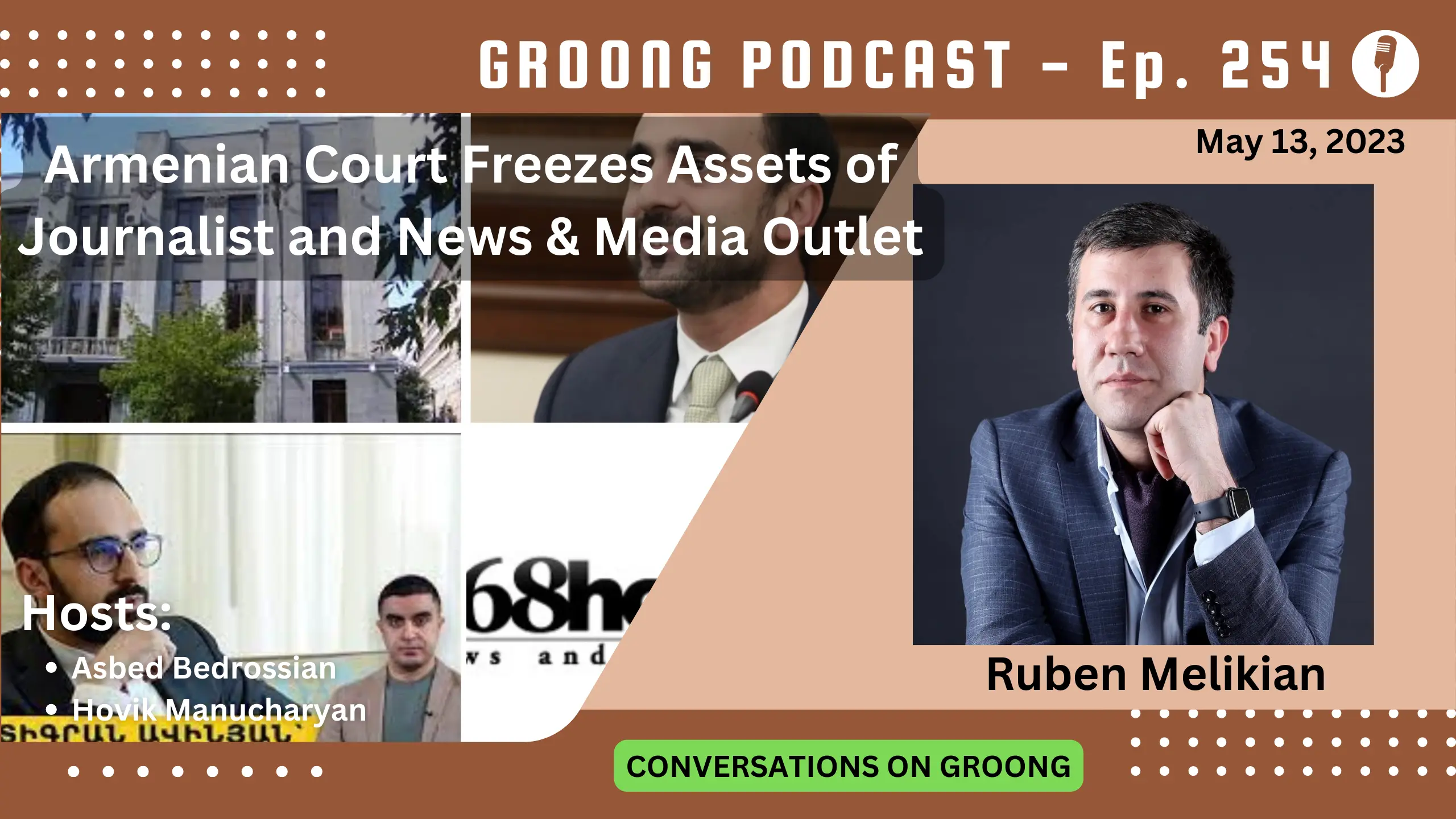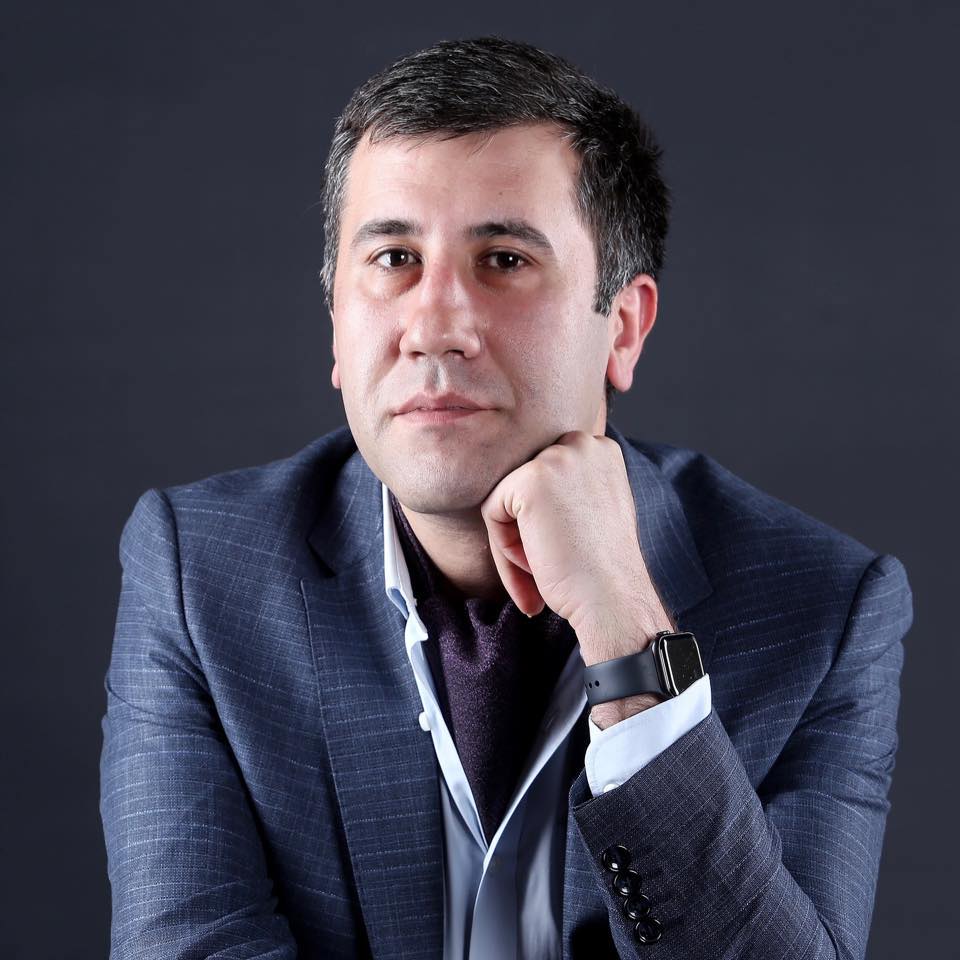Ruben Melikyan - Yerevan Court Freezes Assets of 168.am and Journalist Davit Sargsyan on Tigran Avinyan's Demand | Ep 254 - May 13, 2023 [EP254]
Posted on Saturday, May 13, 2023 | Series: cog
Yerevan Court Freezes Assets of 168.am and Journalist Davit Sargsyan on Tigran Avinyan’s Demand A Conversation with Ruben Melikyan
Guest:
Topics:
Episode 254 | Recorded on Thursday, May 13 2023
Show Notes
Avinyan Suit Freezes Assets of Newspaper & Journalist
In Tigran Avinyan’s civil court case against 168.am and journalist Davit Sargsyan, the judge has decided to freeze $46,000 of the defendants’ assets, an unprecedented development according to journalist unions.
Avinyan alleges that the media outlet slandered him by publishing a video that says that he is one of a number of the newly enriched, in Pashinyan’s close circle of ruling party cronies.
In this segment we’re not so much interested in the allegations either in the video or in the suit, but as a media outlet ourselves we’re interested and concerned about the effect of such legal action, and the resulting court response on the media in Armenia.
We’re joined by Ruben Melikyan, who was formerly Artsakh’s Human Rights Ombudsman, and prior to that he was rector of the Justice Academy of Armenia. In 2019, Melikyan co-founded and currently leads the “Path of Law”. Իրավական ուղի NGO.
The case is still ongoing, a verdict has not been issued.
Questions:
- Is it normal for a court to come down with harsh punitive measures like this before a verdict is issued?
- The court action was in response to Tigran Avinyan’s demand. Is it normal for a court to accede to such demands from a plaintiff, before a verdict is issued?
- Background: Others have noted the absence of a demand to take down the content or issue an apology from the Avinyan legal team, saying that this indicates the motivation of the plaintiff. What do you think about that?
- Do you suspect administrative pressure is being applied on the court to act in this manner?
- Is this action by the court illegal, or unconstitutional? Does it encroach on the rights of the defendants - 168 Zham and/or Davit Sargsyan?
- What is the effect of these actions by the court, and also of a plaintiff who is the deputy, or rather, the acting mayor and a member of the ruling party, to be applying such pressure on a news and media outlet in Armenia?
External Influence on Armenian Media
This regime has been criticized by opponents going as back as the initial days of the so-called revolution in 2018, including:
- Surrounding of courthouses in 2019
- Criminalization of insults
After all this, international NGOs have only slightly degraded Armenia’s ranking in the world corruption index. Critics say the West and the NGOs are still treating this government with kid gloves. Pashinyan, in his turn, has blamed the media for causing the downgrade through negative reporting.
Meanwhile, as recently as last week, USAID allocated over $17 million in support of Armenian media.
Questions:
- What is the role of the international organizations, the civil rights watchdogs, the NGO community at large in Armenia in enabling this kind of behavior?
- Why does USAID think that Armenian media need 17 million dollars in support? Do we know what this support looks like? Note: According to some measures, this is more than double the amount of advertising revenue the industry generates in a year.
Background Notes
Putting pressure on the judiciary or enacting anti-free speech legislation is out of the tool set of authoritarian leaders - but apparently not for newly minted color revolutionaries.
For instance, in 2019, still riding high on post-2018 euphoria, Pashinyan ordered his followers to surround courthouses because he didn’t like the verdict of one of the courts. These actions got very little resonance from democracy watchdogs and the NGO community.
We remember the harsh measures passed under the auspices of anti-covid measures, again without much international criticism.
After the war in 2020, the Pashinyan regime actually criminalized insults. But only against government officials. They had to silently undo this later - due to some muted international criticism, but there were never any threats of sanctions or rapid downgrades on democratic indices that is more common to see in case of regimes that aren’t as favored by the globalist circles.
Since the 2021 elections, the regime has increased fines on the media for so-called defamatory material, and Armenian media that have tried to publish corruption reports on the government have been hacked, with no follow-through on the part of law-enforcement to find out who did it.
Wrap-up
That concludes this Conversations On Groong episode**. **As always we invite your feedback, Thanks to Laura Osborn for the music on our podcasts. Don’t forget to subscribe to us on YouTube, Twitter, and Facebook.
Guests

Ruben Melikyan
Ruben Melikyan was formerly Artsakh’s Human Rights Ombudsman, and prior to that he was rector of the Justice Academy of Armenia. In 2019, Melikyan co-founded and currently leads the “Path of Law” NGO. Իրավական ուղի in Armenian.
Hosts

Asbed Bedrossian
Asbed is founder of the Armenian News Network Groong and co-founder of the ANN/Groong podcast.

Hovik Manucharyan
Hovik Manucharyan is an information security engineer who moved from Seattle to Armenia in 2022. He co-founded the ANN/Groong podcast in 2020 and has been a contributor to Groong News since the late 1990s.
Disclaimer: The views expressed by Hovik Manucharyan on the ANN/Groong podcast are his own and do not necessarily reflect the opinions of his employer or any other organization.